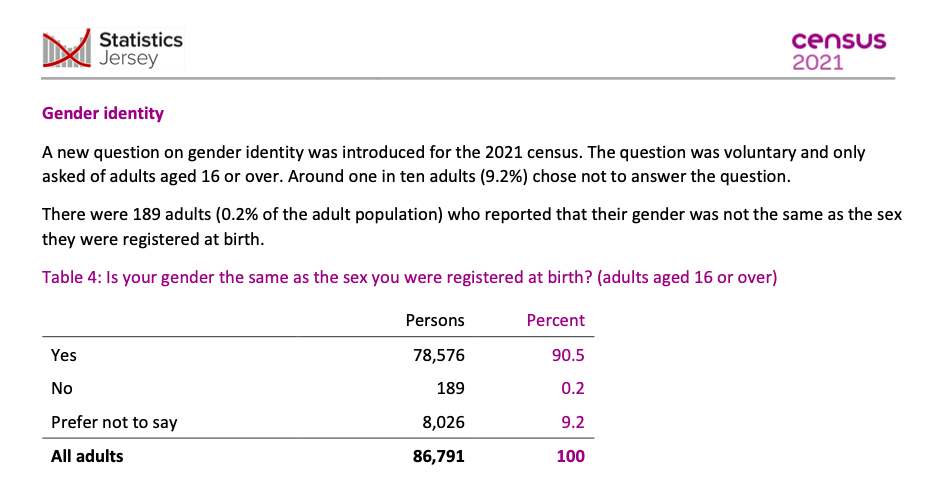


Guernsey's transgender and non binary population is so small it is not currently calculated through the island's annual rolling electronic census or any other official method.
The latest population data was published earlier this month. The statistics are compiled through data held by social security, income tax and other bodies.
It showed that out of a population of 63,711 people at the end of March last year, there were 32,196 women and 31,515 men.
The slight majority in female population follows a long standing trend with the population between the two genders currently split 50.5% (women) and 49.5% (men).

Pictured: Guernsey's population is currently estimated at 63,711.
Within the two categories of men and women there is no way of knowing how many are transgender or would identify as a different gender if they were able to officially.
A spokesperson for the States told Express that information on gender identity is sometimes collected in other ways suggesting it would only show a very small trans or non binary population locally.
"When conducting surveys the States of Guernsey often asks for gender identity and gives options of male, female, non-binary, or an option to self-describe," the spokesperson explained.
"We can see from these surveys, that the number of people who don’t identify as male or female in Guernsey is very small due to the size of Guernsey population, and too small to effect the population statistics within the Census report.
"However for clarity, the Annual Electronic Census Report, is not compiled from standalone surveys, but using existing data from service areas, as a more cost-effective way to regularly provide up-to-date statistics. These include birth and death records, income tax, DVLA registrations and social security contributions, among others.
"The eCensus report therefore reflects data as it is provided to these service areas."

Pictured: Jersey's 2021 census recorded different characteristics among the population.
Guernsey's population statistics are compiled using a rolling electronic census which collates data held by social security, income tax and other bodies.
As a census has not been held since 2001 there is no record of information such a data haul would collect which would include religion, sexuality or gender.
The most recent census in the UK recorded gender identity for the first time, with people asked 'Is the gender you identify with the same as your sex registered at birth?'. The answers were 'yes' or 'no' with a space to write in their gender identity.
2.9 million did not answer the question on gender identity, and out of 45.7 million people who did, 45.4m answered that 'Yes' their gender identity was the same as their sex registered at birth.
262,000 people (0.5%) answered 'No' and added a comment expressing their identity.
Of those, 48,000 identified as a trans man, 48,000 identified as a trans woman, 30,000 identified as non-binary and 18,000 wrote in a different gender identity.
Jersey's 2021 census also asked for responses on gender identity for the first time, with 189 people saying their gender identity is not the same as they were assigned at birth. That is 0.2% of Jersey's population.
FOCUS: '22 population growth exceeded States forecast
FOCUS: Population and housing problems, hand in hand
3000+ new housing units needed if deputies back population growth
Population management paperwork backlog is coming under control
A year on: Gay marriage deemed a success in Guernsey
Same-sex parents still yet to achieve equality in the island
Tax form wording to finally change
Comments
Comments on this story express the views of the commentator only, not Bailiwick Publishing. We are unable to guarantee the accuracy of any of those comments.